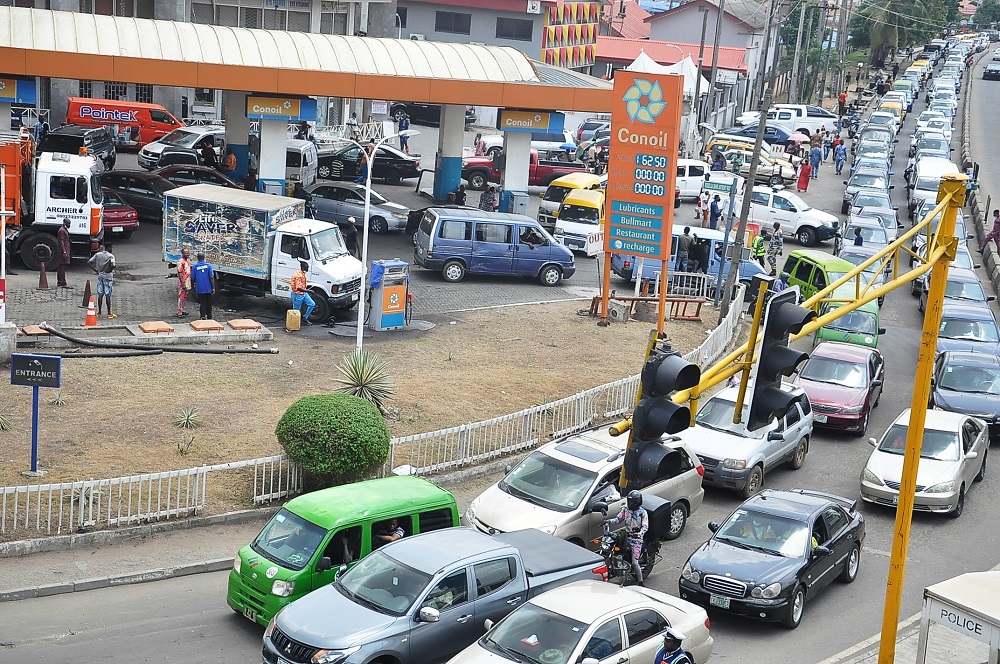It is a sad commentary, a travesty of governance and a national embarrassment that Nigeria’s fuel scarcity situation brings to mind the famous lines from Samuel Taylor Coleridge’s Rimes of the Ancient Mariner, in which the British poet says, ‘Water, water everywhere, nor any drop to drink’.
For a nation so abundantly blessed with some of the biggest oil reserves in the world, and which has the capacity to produce 2.5 million barrels of crude oil per day as Africa’s largest oil producer and in the top 10 in the world, it is incomprehensible that Nigeria’s development, economy and the well-being of its citizens are being hampered by severe shortages of petroleum products.
- Aftermath of primaries: Gombe, Nasarawa govs inaugurate reconciliation c’ttees
- Crisis hits NRM as deputy national chair, northern politicians dump party
Indeed, this ongoing episode, now in its sixth month – since January this year – is a culmination of a culture of neglect, irresponsibility and painful levels of nonchalance from those responsible for administering and regulating the sector. While various agencies and government officials can be and should be held culpable, and haven’t, the buck stops categorically at the table of President Muhammadu Buhari himself, who is the substantive Minister of Petroleum Resources, but who over the last seven years, has failed, by both words and actions, to demonstrate any visible commitment to addressing the problem or fixing it permanently.
The decision to pump billions into getting the refineries working again to ensure the national embarrassment of importing refined petroleum products is brought to an end has become nothing but a conduit pipe down which individuals, contractors, civil servants or public officials are accumulating illicit wealth from the suffering of Nigerians while the nation and its industries groan and are bled dry.
Nigeria’s four refineries in Port Harcourt (2), Kaduna and Warri, with a combined capacity of 445, 000 bpd, have for long been comatose; only sporadically producing the much-needed refined petroleum products. It is more telling; however, this government has not done much to change or resolve this situation in any significant way. Despite the huge spending, none of these refineries has been able to function at any sustainable level for any amount of time and those responsible for these failures have remained in their posts without due sanction or accountability. So woeful is the situation that between June 2019 and June 2020, the Nigerian National Petroleum Company (NNPC) reported that after pumping N85 billion into the four refineries, they only yielded 38,977 metric tonnes of crude production.
Since the mid-1990s, the country has resorted to importing refined petroleum products to make up for the deficit of not refining locally. This has not only created a cabal of powerful importers who now hold the nation by the balls and dictate terms but has also resulted in the importation of contaminated petroleum products that have ruined Nigerians’ vehicles and man-hours, and continuing scarcity, nationwide.
When early in the first term of this administration, the government hiked the prices of petroleum products, Premium Motor Spirit (PMS) more particularly, on the pretext of ending the subsidy regime and perennial scarcity of products that have become like an albatross hanging across the country’s neck, Nigerians groaned but ultimately endured the drastic changes, on the understanding that availability of the products will be sustained for long. That record of several years without fuel scarcity has now been completely reversed, at least, since the beginning of this year.
Furthermore, it is not clear where the government stands now with the subsidy regime. Nigerians find themselves in a situation where while the federal government continues to pile up mounting debts on future generations to fund subsidy, the reality remains that in most parts of the country, consumers pay much higher than the official pump price, due to the prevailing scarcity. This means that while the government pays for subsidy, Nigerians do not enjoy it. The start-stop approach to the subsidy removal shows a clear lack of direction in government planning and a shortage of political will to address the corruption and fleecing in this crucial sector.
Nigerians have never been more patient with any administration regarding fuel price hikes or subsidy removal as they have been with this one. This persistent fuel scarcity, which the government’s body language is trying to normalize, is a cruel reward for this patience. This year alone, Nigerians have lost millions of man-hours queuing up at filling stations for petroleum products. This translates to billions of naira in losses for the economy in general and small businesses in particular, especially when one factors in the fact that this scarcity is concomitant with the epileptic power supply that has kept small businesses and industries either on their knees or heavily reliant on generators and black-market fuel. Having to pay far more for black market fuel to keep industries running and power private residencies has been the bane of many businesses and homes.
The government’s body language towards fuel scarcity suggests nothing but a lack of will to resolve the issue and bring to an end the suffering it inflicts on Nigerians and the economy. This attitude must change immediately. The energy crisis in Nigeria, from fuel scarcity to power failures, has persisted for far too long. This particular shortage has run its course. Enough with the excuses and inaction. The government must act now and act decisively.

 Join Daily Trust WhatsApp Community For Quick Access To News and Happenings Around You.
Join Daily Trust WhatsApp Community For Quick Access To News and Happenings Around You.

